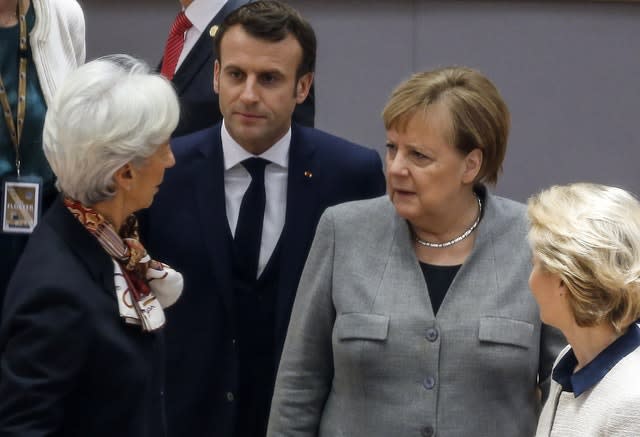Relief and regret in Europe as Johnson poll victory brings Brexit closer
European Union leaders have congratulated Boris Johnson on his sweeping election victory amid optimism that his clear majority should finally allow him to push the long-stalled Brexit divorce deal through a reluctant parliament and end years of political wrangling.
But even as the Brexit dust begins to settle, leaders warned that a huge challenge lies ahead in trying to secure a trade agreement between Europe and the UK in just 11 months.
Most pacts take years to conclude and the lack of time means priorities will have to be set.
“It’s not only about a trade agreement but also speaking about education … about transport, about fisheries, about sectorial questions,” European Commission president Ursula von der Leyen said after the meeting in Brussels. “Many, many other fields are in the portfolio to be negotiated.”
German Chancellor Angela Merkel agreed that concluding an agreement on future ties will be “very complicated” and that “what will matter above all is that we work very quickly and precisely”.
Britain is on January 31 set to become the first country to leave the world’s biggest trading bloc.
Though many EU leaders are relieved that the Brexit saga is finally coming to an end, more than three years after Britons voted to leave, just as many are saddened at the departure of a heavyweight member state.
The sense of relief was evident among European business groups, although it was tinged with regret. The uncertainty over Britain’s future was a big business concern and some companies have shifted operations out of the UK.

Questions remain over the future relationship after Brexit and whether tariff-free trade between the UK and the EU will continue after a departure transition period expires at the end of 2020.
“My hope is that the UK remains an ally, friend and extremely close partner,” said French President Emmanuel Macron. “But on the condition that we manage to define the rules for a loyal relationship. If there is no regulatory convergence, we will not be able to conclude an ambitious trade agreement.”
When Britain voted to leave the EU in June 2016, there were concerns that it could lead to other departures, but those fears have dissipated as the process has been so politically divisive and expensive.
Though the pathway to Britain’s departure by January 31 is reasonably clear, the future relationship between the country and the EU is not. Discussions on that can only begin after Britain formally leaves. The EU has already said that its main Brexit negotiator Michel Barnier will lead those talks.
After congratulating Mr Johnson on his victory, new EU Council president Charles Michel said: “We expect as soon as possible the vote by the British Parliament on the withdrawal agreement.”
“We are ready,” he said. “The European Union will negotiate in order to have close co-operation in the future with the UK.”
But ultimately, the Brexit divorce negotiations may prove to be the easy part. Asked whether it is possible to strike a trade deal in under a year, Mr Michel said: “it is not my intention to predict based on the experience of the past.”

 Yahoo News
Yahoo News 